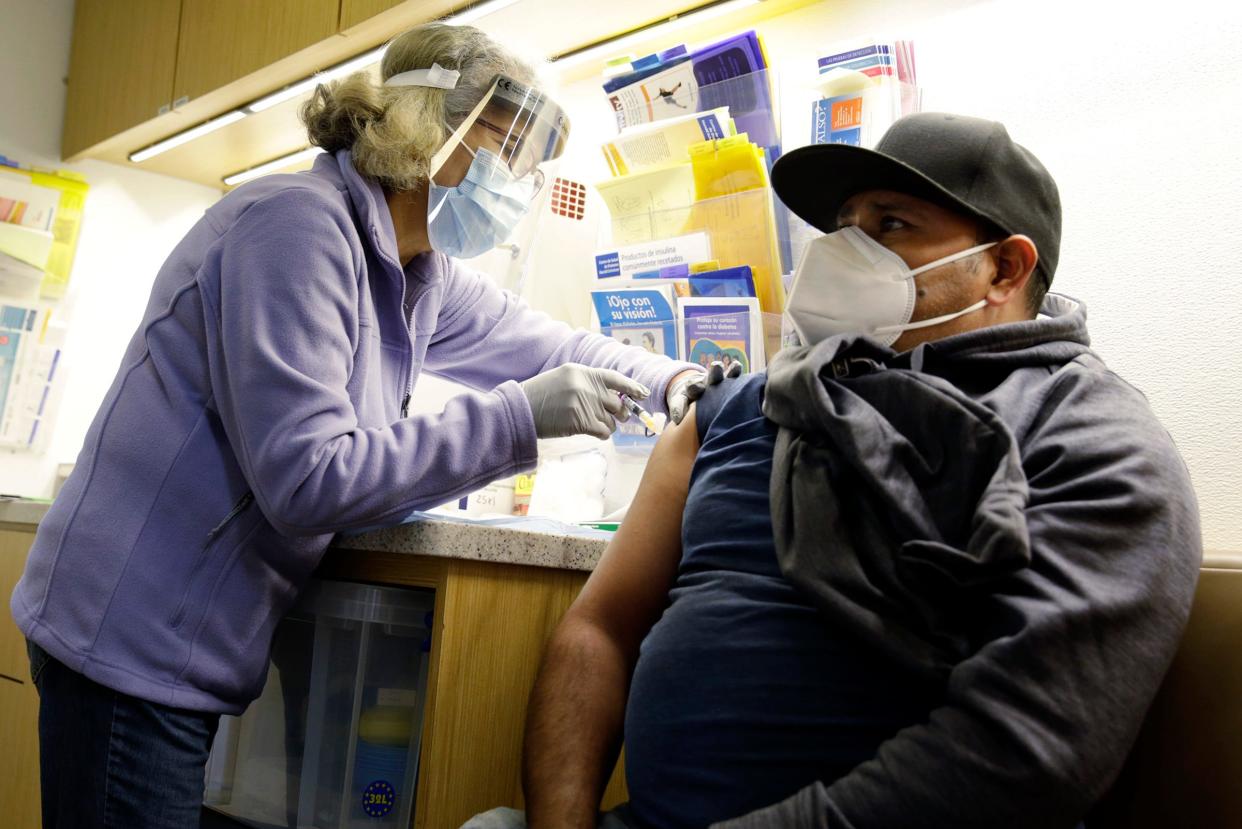Why get vaccinated when COVID-19 seems inevitable and other lessons we're learning

- Oops!Something went wrong.Please try again later.
At the beginning of the COVID-19 pandemic, I told a friend of mine that it felt like I was going into battle. I predicted that by the time this was all over, inevitably, the majority of us would become infected with COVID-19. Both sentiments are as true today as they were back then.
As medical students, we are taught that viruses are stealthy. In fact, we are told that the “dumbest virus” will always outsmart the “smartest” doctor. The omicron variant is living proof; it has managed to sneak through nearly every barrier we have placed in its way.
It finally outsmarted me. After two long and arduous years working daily on the front line, seeing hundreds of patients outside in the cold, wet and frigid weather, experiencing dozens of inadvertent personal and professional direct COVID exposures, administering countless COVID tests, and receiving two COVID-19 vaccinations plus one booster, COVID-19 still attacked.
On one hand, I am not altogether surprised about having finally succumbed to the infectious scourge which, over the past 700 days, has felt akin to one nightmare after the other. On the other hand, I feel a tremendous sense of relief, albeit coupled with a tinge of fear.
I am sharing my experience for a couple of reasons:
It is worth talking about the fact that this variant seems to cause different symptoms than its predecessors.
Vaccines do work, albeit not perfectly.
Vaccinations save lives even when “breakthrough” cases occur.
First, for those who chose to be vaccinated, I can say with personal experience that omicron seems to be a kinder, gentler version. Many who test positive are asymptomatic this time around.
Clinically, if there are symptoms, children and adults alike are presenting with hoarseness or barky cough followed by nasal congestion, headache, and a wicked sore throat. Few are losing their sense of taste and smell. To be sure, the throat pain rivals any infection that I have ever had in my lifetime. In my opinion, that sore throat seemed like the sentinel sign I was infected. Strangely, for most people, the coughing is minimal compared to the other variants.
Second, no vaccination is 100% effective. Over two decades working in medicine, I have witnessed “breakthrough” cases of whooping cough, measles, mumps, chickenpox, influenza, and bacterial and viral meningitis. While I have lost children to these infections who were unvaccinated, I have never lost a child to a “breakthrough” infection. All have fully recovered.
COVID-19 seems to be following the same set of principles. As of this writing, 70% of my staff, including myself, have contracted COVID-19 despite the fact I and my staff were fully vaccinated and boosted. Ironically, none of us contracted our infections in the workplace nor did we spread it to one another. And no one has been hospitalized or developed long-term complications. A number of fully vaccinated children have contracted COVID-19 over the past month, including my own fully vaccinated children. Interestingly enough, my only child who remained negative as COVID worked its way through my household was the one who was boosted precisely two weeks ago.
But I want to address the proverbial elephant in the room: those asking why they should get vaccinated when infection seems inevitable or those patting themselves on the back for refusing to get vaccinated in the first place.
With regard to the omicron variant, the growing gap in survival between the vaccinated and unvaccinated is utterly astonishing. The hospitalization rate in Seattle for unvaccinated people is 10 times higher than for the vaccinated. The death rate for those who remain unvaccinated is twice as high in Seattle and nearly five times higher in New York, where omicron has peaked and is starting to retreat.
Not only are the infections milder in the vaccinated, but also seem less likely to lead to the dreaded long-hauler syndrome. I have seen a number of patients develop complications after having COVID-19: high blood pressure, abnormal heart rhythms, prolonged fatigue, or even asthma-like symptoms. For the vaccinated who contract disease, in early reports, it appears the chance of developing long-term complications is far lower.
Reflecting on the past two years, I realize how much our lives have changed in our homes, our schools, our workplaces. We have grappled with our own individual mortality in a way I never imagined, we have explored our beliefs about science and safety as a community, and we have contended with how our nation chooses to define personal freedom. The way we look at our schools, our workplaces or even our toilet paper will never be the same.
At the same time, I have a renewed sense of confidence in the miracle of science and the magic of preventive medicine. Most of all, as my quarantine comes to an end, I feel grateful — to be alive and to imagine a future where our ability as a nation to continue addressing our health problems gets back on track.
Dr. Niran Al-Agba is a pediatrician in Silverdale and writes a regular column for the Kitsap Sun. Contact her at niranalagba@gmail.com.
This article originally appeared on Kitsap Sun: why get vaccinated COVID-19 lessons two years into pandemic

